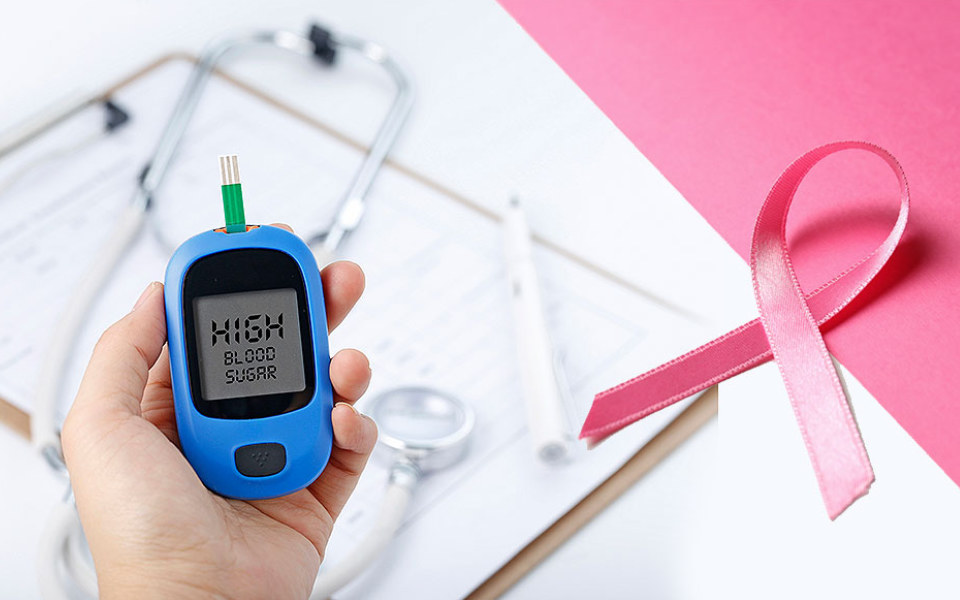Diabetes and cancer are two of the most prevalent and serious health concerns worldwide, affecting millions of people and placing a significant burden on healthcare systems. Diabetes is a metabolic disorder distinguished by high blood sugar levels, while cancer refers to a group of diseases involving abnormal cell growth with the potential to invade or spread to other parts of the body.
The relationship between diabetes and cancer has become an increasingly important area of research and clinical focus in recent years. Studies have shown that people with diabetes, specifically type 2 diabetes, have a higher risk of developing certain types of cancer compared to those without diabetes. It’s estimated that approximately 20% of cancer patients also have diabetes.
Understanding the connection between these two major diseases is crucial for several reasons. First, it can help identify people who may be at higher risk and allow for more targeted screening and prevention efforts. Second, it may lead to improved treatment strategies for patients dealing with both conditions simultaneously. Finally, exploring the shared biological mechanisms could potentially uncover new therapeutic targets for both diabetes and cancer.
As the global prevalence of diabetes continues to rise, and cancer remains a leading cause of death worldwide, clarifying the complex interplay between these diseases has become increasingly important for public health, clinical practice, and scientific research. This growing body of knowledge has the potential to significantly impact patient care and outcomes for millions of people affected by diabetes and cancer.
The Link Between Diabetes and Cancer
1. Increased Cancer Risk in Diabetics
Numerous epidemiological studies have established a significant association between diabetes and an increased risk of various types of cancer. People with diabetes, specifically type 2 diabetes, are at a higher risk of developing cancers such as pancreatic, liver, colorectal, breast, endometrial, and bladder cancers. For example, meta-analyses have reported that people with type 2 diabetes have a risk ratio ranging from 1.2 to 1.4 for colorectal cancer (CRC) compared to those without diabetes [1]. Similarly, diabetes has been linked to higher incidence and mortality rates of breast cancer, with diabetic women often presenting with more advanced stages of the disease [2].
However, it is notable that diabetes appears to have a protective effect against prostate cancer, with a lower incidence observed in diabetic patients [3]. This complex relationship underscores the need for further research to fully understand the mechanisms at play.
2. Common Risk Factors
Several risk factors are common to both diabetes and cancer, contributing to the increased incidence of these diseases in the same people. These shared risk factors include:
- Obesity: Excess body weight is a well-established risk factor for both diabetes and several types of cancer, including colorectal, breast, and endometrial cancers. Obesity contributes to insulin resistance, a hallmark of type 2 diabetes, and is also associated with increased levels of inflammatory cytokines and hormones that can promote cancer cell growth [4].
- Age: The risk of both diabetes and cancer increases with age. As people age, the likelihood of developing insulin resistance and other metabolic disorders rises, as does the cumulative exposure to carcinogens and the likelihood of genetic mutations leading to cancer.
- Physical Inactivity: A sedentary lifestyle is a significant risk factor for both diseases. Lack of physical activity contributes to weight gain, insulin resistance, and chronic inflammation, all of which can increase the risk of developing both diabetes and cancer [5].
- Diet: Poor dietary habits, such as high consumption of processed foods, red meat, and sugary beverages, are linked to both diabetes and cancer. These dietary patterns can lead to obesity and metabolic disturbances that increase the risk of both conditions.
- Smoking: Smoking is a known risk factor for many cancers and is also associated with an increased risk of type 2 diabetes. The harmful effects of smoking include promoting insulin resistance and chronic inflammation, which can contribute to the development of both diseases.
- Alcohol Consumption: Excessive alcohol intake is linked to an increased risk of several cancers and can also contribute to the development of type 2 diabetes by causing weight gain and metabolic disturbances.
Understanding these shared risk factors is crucial for developing integrated prevention strategies that can simultaneously reduce the risk of both diabetes and cancer. By addressing lifestyle factors such as diet, physical activity, and smoking, people can lower their risk of developing these serious health conditions.
Types of Cancer Associated with Diabetes
1. Higher Risk Cancers
People with diabetes, specifically type 2 diabetes, have an increased risk of developing several types of cancer. The most notable cancers with higher risk include:
- Liver Cancer: Diabetics have a significantly higher risk of liver cancer, with studies showing a risk ratio of about twofold or higher. This is partly due to factors like nonalcoholic fatty liver disease and cirrhosis, which are more common in diabetics [6].
- Pancreatic Cancer: The risk of pancreatic cancer is also markedly higher in people with diabetes. This association is complex due to the potential for reverse causality, where pancreatic cancer can lead to diabetes. However, studies focusing on diabetes preceding cancer diagnosis by at least five years confirm a strong link [7].
- Colorectal Cancer: Diabetics have a 1.2 to 1.5 times higher risk of developing colorectal cancer. This increased risk is attributed to factors like insulin resistance and chronic inflammation.
- Endometrial Cancer: The risk of endometrial cancer is about twofold higher in women with diabetes. This is influenced by hyperinsulinemia and hormonal imbalances associated with diabetes.
- Breast Cancer: Women with diabetes have a higher risk of breast cancer, with studies indicating a risk ratio of approximately 1.2 to 1.5. Obesity, common in type 2 diabetes, is a significant contributing factor.
- Bladder Cancer: There is a modest increase in the risk of bladder cancer among diabetics, potentially due to chronic hyperinsulinemia and frequent urinary tract infections.
2. Cancer Risk Differences Between Type 1 and Type 2 Diabetes
The cancer risk profiles differ between type 1 and type 2 diabetes due to their distinct pathophysiology:
- Type 1 Diabetes: This autoimmune condition is associated with a slightly increased risk of certain cancers, such as cervical and stomach cancers. However, the overall cancer risk in type 1 diabetes is less well-documented and appears to be lower compared to type 2 diabetes [8].
- Type 2 Diabetes: This form of diabetes is more strongly linked to an increased risk of various cancers, including liver, pancreatic, colorectal, endometrial, breast, and bladder cancers. The higher cancer risk in type 2 diabetes is largely attributed to factors like obesity, insulin resistance, and chronic inflammation [9].
While both types of diabetes are associated with an increased risk of certain cancers, the risk is generally higher and more extensively documented in type 2 diabetes. This underscores the importance of targeted cancer screening and prevention strategies for people with diabetes.
Biological Mechanisms Between Diabetes and Cancer

Several biological mechanisms have been identified that potentially link diabetes and cancer, providing insight into the increased cancer risk observed in diabetic patients:
1. Hyperinsulinemia and Insulin Resistance
Hyperinsulinemia, a hallmark of type 2 diabetes, is strongly associated with increased cancer risk [10]. Insulin is a potent growth factor that can promote cell proliferation and carcinogenesis both directly and indirectly:
- Direct effects: Insulin binds to insulin receptors on cancer cells, stimulating cell division and inhibiting apoptosis.
- Indirect effects: Hyperinsulinemia increases the bioavailability of insulin-like growth factor 1 (IGF-1) by inhibiting IGF-binding protein-1. IGF-1 is a more potent mitogen than insulin and can further promote cell proliferation and inhibit apoptosis [11].
Insulin resistance, which leads to hyperinsulinemia, may thus create an environment conducive to developing cancer.
2. Chronic Inflammation
Diabetes is described by a state of chronic low-grade inflammation, which is increasingly recognised as a key factor in cancer development [12]. This inflammatory state is associated with:
- Elevated levels of pro-inflammatory cytokines such as interleukin-6 (IL-6) and tumour necrosis factor-alpha (TNF-α).
- Increased oxidative stress and DNA damage.
- Activation of nuclear factor-kappa B (NF-κB), a transcription factor involved in cancer cell proliferation, survival, and metastasis.
Chronic inflammation can promote genetic instability and create a tumour-supportive microenvironment, potentially explaining the link between diabetes and increased cancer risk.
3. Hyperglycaemia
Elevated blood glucose levels, characteristic of diabetes, may contribute to cancer development through several mechanisms:
- Providing abundant energy for rapidly dividing cancer cells.
- Inducing oxidative stress and DNA damage.
- Promoting the formation of advanced glycation end products (AGEs), which can activate pro-inflammatory pathways.
While hyperglycaemia’s role in cancer development is less well-established than that of hyperinsulinemia, it likely contributes to the overall cancer-promoting environment in diabetic patients.
4. Shared Genetic Factors
Recent research has uncovered genetic links between type 2 diabetes and multiple cancers [13]. Key findings include:
- Identifying two specific genetic variants associated with type 2 diabetes and certain cancers (breast, colorectal, and pancreatic).
- Discovery of 17 genetic variants that directly increase type 2 diabetes risk and indirectly increase cancer risk through diabetes-related biological processes.
These shared genetic factors help explain the observed associations between diabetes and cancer, suggesting common underlying pathways that may influence the development of both conditions.
The biological mechanisms between diabetes and cancer are complex and multifaceted. Hyperinsulinemia, chronic inflammation, hyperglycaemia, and shared genetic factors all contribute to creating an environment that promotes cancer development and progression in diabetic patients. Understanding these mechanisms is crucial for developing targeted prevention strategies and improving cancer outcomes in people with diabetes.
Impact of Diabetes on Cancer Prognosis and Treatment

The impact of diabetes on cancer prognosis and treatment is significant, presenting several challenges for patients and healthcare providers. Here are the key effects and challenges:
1. Effects on Cancer Outcomes and Survival Rates
Diabetes negatively impacts cancer outcomes and survival rates:
- Studies show that cancer patients with diabetes have higher all-cause and cancer-specific mortality compared to those without diabetes [14].
- The risk of death from any cause is approximately 85% higher for cancer patients with complicated diabetes compared to those without diabetes [15].
- Cancer-specific mortality is about 41% higher in patients with complicated diabetes.
- These effects are more pronounced in women and patients with early-stage cancers.
- Diabetes is associated with increased cancer recurrence rates, with a 10-11% higher risk observed in colorectal cancer patients.
2. Challenges in Cancer Treatment for Diabetic Patients
Treating cancer in patients with diabetes presents several challenges:
- Diabetic complications like chronic renal insufficiency, cardiovascular disease, and peripheral neuropathy may limit treatment options or optimal dosing [16].
- These limitations can lead to suboptimal care, potentially resulting in lower response rates and shorter survival.
- Managing blood glucose levels becomes more complex during cancer treatment, as some therapies and medications (e.g., steroids) can worsen hyperglycaemia.
- Diabetic patients may require more frequent monitoring and changes to their diabetes management plan during cancer treatment.
3. Increased Risk of Chemotherapy-Induced Complications
Diabetic cancer patients face a higher risk of treatment-related complications:
- Chemotherapy-induced peripheral neuropathy (CIPN) is more common and potentially more severe in diabetic patients [17].
- CIPN can lead to treatment delays and dose reductions, potentially compromising cancer treatment efficacy.
- Diabetic patients are at increased risk of infections and treatment-related toxicities.
- Neuropathic symptoms may persist longer in diabetic patients, with effects lasting up to two years after treatment in some cases.
Diabetes significantly complicates cancer treatment and negatively impacts prognosis. It imposes a carefully coordinated approach to care, involving oncologists, endocrinologists, and other specialists to optimise cancer treatment and diabetes management. Personalised treatment plans, close monitoring, and proactive management of complications are crucial for improving outcomes in this patient population.
Cancer’s Impact on Diabetes Management
Cancer treatment can drastically impact diabetes management, causing various challenges for patients and healthcare providers:
1. Glycemic Challenges in Cancer Treatment
Cancer treatments can make glycemic control more challenging for diabetic patients:
- Chemotherapy: Many chemotherapy agents can cause fluctuations in blood glucose levels. For example, 5-fluorouracil (5-FU) analogues have been associated with hyperglycaemia [18].
- Stress and Inflammation: The physical and emotional stress of cancer and its treatment can lead to increased blood glucose levels.
- Changes in Diet and Physical Activity: Cancer and its treatment often affect appetite, food intake, and physical activity levels, making it difficult to maintain consistent blood glucose control.
- Prioritising Cancer Treatment: Research has shown that diabetes patients undergoing chemotherapy often prioritise their cancer treatment over managing their diabetes, increasing the risk of poor glycemic control [19].
2. Effects of Certain Cancer Therapies on Diabetes
Several cancer therapies can directly impact diabetes management:
- Glucocorticoids: Commonly used alongside chemotherapy, glucocorticoids can significantly increase blood glucose levels. They have been associated with new-onset hyperglycaemia and can worsen existing diabetes.
- Targeted Therapies: Some targeted cancer therapies can affect glucose metabolism:
- PI3K/AKT/mTOR inhibitors can disrupt insulin signalling pathways, leading to hyperglycaemia.
- Immune checkpoint inhibitors (ICIs) have been associated with immune-related adverse events, including new-onset diabetes.
- Immunotherapy: In rare cases, immunotherapy can lead to immunotherapy-induced diabetes, a form of type 1 diabetes that can develop rapidly and may be permanent [20].
3. Additional Considerations
- Monitoring Challenges: The focus on cancer treatment may lead to reduced attention to diabetes management by both oncologists and primary care providers.
- Treatment Interactions: Some diabetes medications may need to be adjusted or discontinued during cancer treatment due to potential interactions or side effects.
- Long-term Effects: Certain cancer therapies can have lasting effects on glucose metabolism, potentially leading to persistent hyperglycaemia even after treatment ends.
- Quality of Life Impact: Cancer-related symptoms and diabetes management can significantly affect a patient’s quality of life [21].
Managing diabetes in cancer patients requires a coordinated approach involving oncologists, endocrinologists, and primary care providers. Regular monitoring of blood glucose levels, adjusting diabetes medications as needed, and educating patients about the potential impacts of cancer treatment on their diabetes management are crucial steps in providing comprehensive care for these complex patients.
Prevention and Risk Reduction Strategies

Key strategies for preventing and reducing cancer risk in diabetic patients include:
1. Lifestyle Changes
Lifestyle changes play a crucial role in both diabetes management and cancer prevention:
Diet: Adopt a healthy diet that includes:
- Plenty of vegetables, fruits, and whole grains
- Lean proteins
- Limited intake of red and processed meats
- Reduced consumption of sugary foods and refined carbohydrates
- Avoided alcohol consumption
Exercise: Regular physical activity is essential:
- Try at least 150 minutes of moderate-intensity exercise per week
- Combine aerobic and anaerobic exercises and strength training
- Reduce sedentary time throughout the day
Weight Management: Maintaining a healthy weight is crucial, as obesity increases the risk for both diabetes complications and certain cancers:
- Focus on calorie control through a balanced diet
- Engage in regular exercise
- Implement behavioural changes to support long-term weight loss and maintenance
2. Importance of Regular Cancer Screenings
Diabetic patients should follow the recommended cancer screening guidelines:
- Regular mammograms for breast cancer screening in women
- Colonoscopies for colorectal cancer screening
- Prostate cancer screening for men (PSA testing and digital rectal exams)
- Cervical cancer screening for women (Pap smears)
- Skin cancer screenings
It’s important to note that cancer screening rates are significantly lower in people with diabetes compared to those without diabetes. Healthcare providers should emphasise the importance of these screenings for diabetic patients, as they may be at higher risk for certain cancers.
3. Glycemic Control and Cancer Prevention
Maintaining good glycemic control through proper diabetes management may help reduce cancer risk:
- Take diabetes medications as prescribed
- Regularly monitor blood glucose levels
- Work closely with healthcare providers to optimise diabetes treatment
Some studies suggest that certain diabetes medications, like metformin, may have anti-cancer properties, although more research is needed to confirm this.
Good glycemic control is essential during cancer treatment, as hyperglycaemia has been associated with:
- Increased risk of chemotherapy-induced complications
- Potential attenuation of chemotherapy efficacy
- Higher risk of infections and hospitalisations
By implementing these lifestyle changes, following cancer screening recommendations, and maintaining good glycemic control, diabetic patients can potentially reduce their risk of developing cancer and improve outcomes if cancer does occur. Patients must work closely with their healthcare team to develop a personalised prevention strategy based on their risk factors and medical history.
Conclusion
The tricky relationship between diabetes and cancer represents a significant challenge in modern healthcare, with far-reaching implications for patient care, research, and public health strategies. Throughout this article, several key points have emerged:
- Epidemiological evidence demonstrates an increased risk of certain cancers in people with diabetes, specifically type 2 diabetes.
- Common risk factors, such as obesity, physical inactivity, and poor diet, contribute to both diabetes and cancer, highlighting the importance of lifestyle changes.
- Complex biological mechanisms, including hyperinsulinemia, chronic inflammation, and hyperglycaemia, underlie the connection between these two conditions.
- Diabetes significantly impacts cancer prognosis and treatment, often leading to poorer outcomes and increased complications.
- Cancer and its treatments can complicate diabetes management, requiring careful monitoring and adjustment of glycemic control strategies.
- Prevention and risk reduction strategies, including lifestyle changes and regular cancer screenings, are crucial for people with diabetes.
The interplay between diabetes and cancer underscores the critical need for integrated care approaches. Patients with both conditions require coordinated management from multidisciplinary teams, including endocrinologists, oncologists, and primary care providers. This collaborative approach ensures that treatment strategies for one condition do not adversely affect the other and that patients receive comprehensive, personalised care.
As the global prevalence of diabetes continues to rise and cancer remains a leading cause of mortality worldwide, addressing the intersection of these diseases becomes increasingly important. By fostering interdisciplinary collaboration, advancing research efforts, and implementing integrated care models, we can improve outcomes and quality of life for the millions of people affected by both diabetes and cancer.
In conclusion, the diabetes-cancer connection represents a serious area of focus in modern medicine. As our understanding of this relationship deepens, it offers opportunities for improved prevention, early detection, and more effective treatments. The path forward requires continued dedication to research, education, and patient-centred care strategies that address the unique challenges posed by the coexistence of these two complex conditions.
Stay Informed & Inspired with Our Newsletter
Sign up for our newsletter to stay informed about the latest updates, episodes, helpful tips and strategies for diabetes management and holistic wellness.


